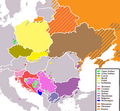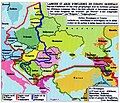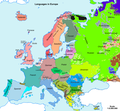Talk:Dialects of Macedonian
| This is the talk page for discussing improvements to the Dialects of Macedonian article. This is not a forum for general discussion of the article's subject. |
Article policies
|
| Find sources: Google (books · news · scholar · free images · WP refs) · FENS · JSTOR · TWL |
| Archives: 1 |
| This article is rated Start-class on Wikipedia's content assessment scale. It is of interest to the following WikiProjects: | |||||||||||||||||||||
| |||||||||||||||||||||
Removal of POV Map - To Be Followed by Placing POV Tags on all Pages where it is placed
[edit]So basically this is made "based on data after a map in Z. Topolińska and B. Vidoeski (1984)" and in B. Comrie and G. Corbett (eds.), The Slavonic Languages, New York: Routledge, p. 247; who cites in turn K. Koneski Pravopisen rečnik na makedonskiot literaturen jazik. Aha, there is absolutely no involvement of any Macedonians here.
Please remake the map to suit current opinions in sociolinguistics and Slavistics - i.e., up to state border with Bulgaria and no further than yat boundary in Greece. I have given enough sources in the talk page of Eastern South Slavic. This is not a question of a single parameter - like reflexes of tj and dj (Macedonian, for the entire Macedonian region) or of big yus (Bulgarian, for Balkan Slavic). You claim Bulgarian dialects where pretty much no one considers themselves Macedonian (and which structurally are quite different from Standard Macedonian) as your. This is chauvinist POV. VMORO 21:52, 10 May 2023 (UTC)
- You convenietly left out Friedman, another non-Macedonian whose work forms part of the base of this map.
:::And who is one of the two mothers of the Macedonian language, along with Horace Lunt. Horace Lunt has already admitted to receiving funding from your Ministry of Culture.VMORO 22:44, 10 May 2023 (UTC)
- Since you love bringing other content into a debate, as seen in the South Slavic languages talkpage, I'll make you aware about the use of this map on the page for the Bulgarian language.
:::Well, there is a slight difference, isn't there? It shows the reflexes of the big yus across the entire Balkan Slavic area. It may have been intended as a nationalistic map, but it actually serves a purpose. It doesn't say that all this area is Bulgarian, does it? What does it say? "Map of the big yus (*ǫ) isoglosses in Eastern South Slavic and eastern Torlakian according to the Bulgarian Academy of Sciences' atlas from 2001.[85] Pronunciation of man and tooth, derived from proto-words zǫbъ mǫžь on the map" Do you see anywhere claims against Macedonian? I don't.
- And I'm fine with it - since it is clearly stated that it is the POV of the Bulgarian Academy of Sciences. Just like the edit which you reverted had a clarification that it was the prevailing view of Macedonian dialectology, backed up by foreign-language sources and coupled by Linstedt's view, in the form of a reference and quote.
:::Nope. This is a map of reflexs. No POV of any Academy.
- This map portray's the Macedonian dialectological POV on the dialects of Macedonian, which is logical since this page is about Macedonian. Unlike the South Slavic languages map, which attempts to portray itself as taking into consideration all relevant POVs, while it is clearly not doing that. But again, this might border WP:OTHERCONTENT.
:::Which Wikipedia policy says "we can do whatever we want on our pages"? I don't think there is such a policy
- PS: You haven't presented any sources in the Eastern South Slavic page.
:::What are you talking about? I removed a map until it is defined better. The exact same thing you did. VMORO 22:44, 10 May 2023 (UTC)
- Kluche (talk) 22:23, 10 May 2023 (UTC)
- Firstly, I'd like to kindly request that you structure your replies into one comment, as opposed to replying immediatly bellow my points - to my knowledge it is standard formatting to do so.
- 1. You are speculating and bringing up another lingiust. Also, "two mothers", what?
- 2. Read how the map is presented in the article - Extent of Bulgarian dialects according to the Bulgarian Academy of Sciences.... So yes, it does say that all of that area is Bulgarian.
- 3. Read my second point.
- 4. Firtly, WP:OWN - no one owns any article page. Second, WP:ATTRIBUTEPOV - the POV that it is the view of the Bulgarian Academy of Sciences is clearly stated in the article for the Bulgarian language, hence I'm fine with it. You reverted such edit for the map here, along with other text restructuring for which you did not provide a reason.
- 5. You stated that you provided sources in the Eastern South Slavic talkpage - you didn't, you listed a buch of researchers. Kluche (talk) 09:42, 11 May 2023 (UTC)
Fyi, there are all maps of Europe/the Balkans already on Wikipedia, in most of them Bg and Mk have been portrayed together and with the same colour. Your point, Kluche? VMORO 22:27, 10 May 2023 (UTC)
Plus: Plus: http://www.muturzikin.com/carteseurope/europe.htm http://www.muturzikin.com/carteseurope/europe.htm https://i.redd.it/80rqlzt5j4l81.jpg https://www.pinterest.com/pin/319685273534333646/ https://www.quora.com/Do-people-in-the-Balkans-speak-the-same-language https://mapsontheweb.zoom-maps.com/post/700434830247297024/language-of-balkans-by-hellenicmaps https://www.google.com/search?q=ethnic+groups+in+southeastern+europe&rlz=1C1YTUH_enBG1036BG1036&sxsrf=APwXEddVBXcF0Z3Tu1yOJ_QYL9fsPG-mYA:1683757997148&source=lnms&tbm=isch&sa=X&ved=2ahUKEwja57qq5-v-AhUZR_EDHR71DVMQ_AUoAXoECAEQAw&biw=1536&bih=624&dpr=1.25#imgrc=0j4st2Trn4oE6M https://commons.wikimedia.org/wiki/File:Languages_of_Europe_map.png VMORO 22:36, 10 May 2023 (UTC)
Proposed removal of POV map (and/or its correction)
[edit]The map in question can be found on the right.

Arguments for its removal:
1) The article reflects the North Macedonian POV that all dialects spoken on the geographic theory of Macedonia are dialects of the Macedonian language. A similar POV opinion of Bulgarian dialectology is that all Macedonian dialects are dialects of the Bulgaria language.
2) Both opinions had its heydays—Slavic dialects in all of Macedonia used to be considered Bulgarian until 1915, or even until 1944. Slavic dialects in all of Macedonia then used to be considered Macedonian until the earkt 1990s—as no one in the West trusted Bulgarian census, in view of the assimilation campaign against the Turks. However, in relation to Macedonian, the Bulgarian census in 1965 proves to be quite accurate. The current number of ethnic Macedonians in Bulgaria is approx. 1,100 (see Demographics of Bulgaria), and it is three times as low as the number of ethnic Bulgarians in North Macedonia, approx. 3,500 (see Demographics of North Macedonia).
3) According to sociolinguistics, in cases such as Bulgarian and Macedonian, where there is no sharp disctinction between the languages, but there is a gradual dialect continuum, it is ethnic and linguisgtic identity that determines boundaries and that also defines what is a language. I would also remind that the primary reason why Macedonian is considered an independent language is because Macedonians jointly believe that they are a separate people, speaking a separate language. The same principle applies to Pirin Macedonia, where people jointly believe that they are the same people as the Bulgarians and speak a mere dialect (group of very different dialects btw).
4) Some sources:
*- Chambers, Jack; Trudgill, Peter (1998). Dialectology (2nd ed.). Cambridge University Press. pp. 7.
Similarly, Bulgarian politicians often argue that Macedonian is simply a dialect of Bulgarian – which is really a way of saying, of course, that they feel Macedonia ought to be part of Bulgaria. From a purely linguistic point of view, however, such arguments are not resolvable, since dialect continua admit of more-or-less but not either-or judgements.
*- Loring M. Danforth (1997), The Macedonian conflict: ethnic nationalism in a transnational world, Princeton University Press, isbn=978-0691043562| p.
67:
Sociolinguists agree that in such situations the decision as to whether a particular variety of speech constitutes a language or a dialect is always based on political, rather than linguistic criteria (Trudgill 1974:15). A language, in other words, can be defined "as a dialect with an army and a navy" (Nash 1989:6).
* - Trudgill P., 2000, "Greece and European Turkey: From Religious to Linguistic Identity". In: Stephen Barbour and Cathie Carmichael (eds.), Language and Nationalism in Europe, Oxford : Oxford University Press, p. 259.:
As for the Slavic dialects of Greece, Trudgill classifies the dialects in the east Greek Macedonia as part of the Bulgarian language area and the rest as Macedonian dialects
* –-Boeschoten, Riki van (1993): Minority Languages in Northern Greece. Study Visit to Florina, Aridea, (Report to the European Commission, Brussels)
"The Western dialect is used in Florina and Kastoria and is closest to the language used north of the border, the Eastern dialect is used in the areas of Serres and Drama and is closest to Bulgarian, the Central dialect is used in the area between Edessa and Salonica and forms an intermediate dialect"
* –Tomasz Kamusella, Motoki Nomachi, Catherine Gibson as ed., The Palgrave Handbook of Slavic Languages, Identities and Borders, Springer, 2016; ISBN 1137348399, p. 436.:
"The Western dialect is used in Florina and Kastoria and is closest to the language used north of the border, the Eastern dialect is used in the areas of Serres and Drama and is closest to Bulgarian, the Central dialect is used in the area between Edessa and Salonica and forms an intermediate dialect.
* –Tomasz Kamusella, Motoki Nomachi, Catherine Gibson as ed., The Palgrave Handbook of Slavic Languages, Identities and Borders, Springer, 2016; ISBN 1137348399, p. 436. // Jouko Lindsdedt, Conflicting Nationalist Discourses in the Balkan Slavic Language Area (https://www.academia.edu/10646592/Conflicting_Nationalist_Discourses_in_the_Balkan_Slavic_Language_Area), p.1 :
Macedonian dialectology... considers the dialects of south-western Bulgaria to be Macedonian, despite the lack of any widespread Macedonian national consciousness in that area. The standard map is provided by Vidoeski.(1998: 32) It would be futile to tell an ordinary citizen of the Macedonian capital, Skopje, that they do not realise that they are actually speaking Bulgarian. It would be equally pointless to tell citizens of the southwestern Bulgarian town of Blagoevgrad that they (or at least their compatriots in the surrounding countryside) do not ‘really’ speak Bulgarian, but Macedonian. In other words, regardless of the structural and linguistic arguments put forth by a majority of Bulgarian dialectologists, as well as by their Macedonian counterparts, they are ignoring one, essential fact – that the present linguistic identities of the speakers themselves in various regions do not always correspond to the prevailing nationalist discourses
5) Btw, this was how the border between Serbian and Bulgarian was defined in the 1950s after n x number of wars—as the border between the two countries prior to 1919, when Serbia was ceded two Bulgarian regions.
6) Kluche has already agreed on South Slavic Languages that the border should be state border and than the yat border in Greece. However, here it is different. Why is it different? There is no plausible reason in favour of this.
7) I think that instead of claiming this and claiming that, we should find ways to separate, peacefully—and this is one good reason to start that. I don't know if anyone really believes Pirin Macedonia speaks "Macedonian", if they do, they should go to hav their ears cleaned.
8) Please correct the map or take it down until a new one is prepared. VMORO 15:12, 16 May 2023 (UTC)










